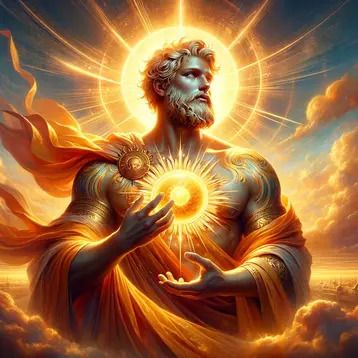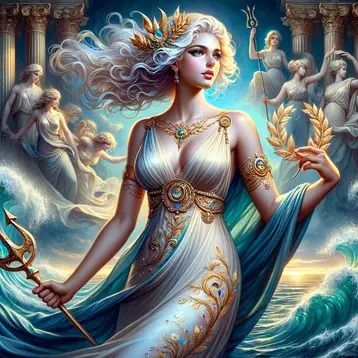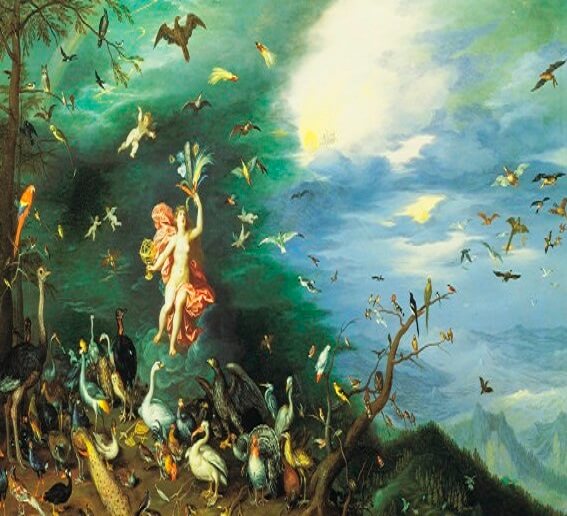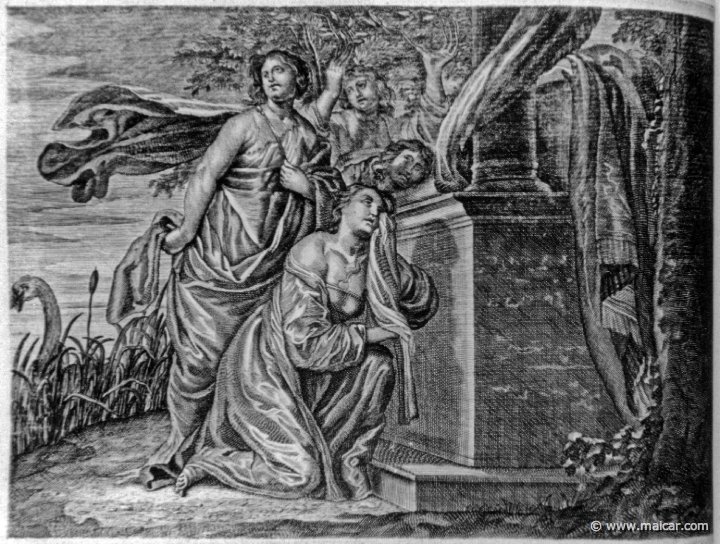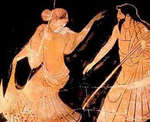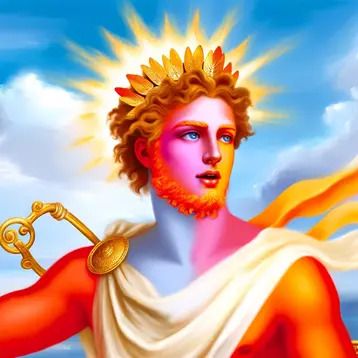
Helios
Helios was one of the Titans, son of Hyperion and Theia and brother of Eos (the Dawn) and Selene (the Moon). The personification of the Sun, he was portrayed as driving a four-horse chariot across the sky on a daily basis. Helios was married to Perse, but he had quite a few extramarital affairs, and a number of children; these include the Charites, Phaethon, Circe, Aeetes, Pasiphae, Heliadae, and Heliades. At a later time, Helios was conflated with Apollo; to the Romans, he was known as Sol.
Family
Helios, the Greek god of the sun, was the only son of the Titans Hyperion (“The High One”) and Theia (“divine”; sometimes also called Euryphaessa, the “wide-shining”). The couple had two daughters as well: “rich-tressed” Selene and “rosy-armed” Eos, who represent, respectively and appropriately, the Moon and the Dawn.
Portrayal
The image of Helios driving his “golden-yoked” four-horse chariot – sometimes in the company of his sisters – is one of the most recognizable images in all of Greek art. “As he rides in his chariot,” writes marvelously of him the poet of the 31st Homeric Hymn, “he shines upon men and deathless gods, and piercingly he gazes with his eyes from his golden helmet. Bright rays beam dazzlingly from him, and his bright locks streaming from the temples of his head gracefully enclose his far-seen face: a rich, fine-spun garment glows upon his body and flutters in the wind: and stallions carry him.”
Initially described collectively as “fire-darting steeds,” Helios’ four horses would later get fitting sun-related names: Pyrois (“the firey one”), Eous (“belonging to the dawn”), Aethon (“blazing”), and Phlegon (“burning”).
Helios’ Women and His Children
Helios was married to Perse, but just like many other male gods, he had quite a few well-known affairs, most famously with Clymene, Rhode, and Leucothoe.
Perse
According to most accounts, Helios was married to the Oceanid Perse (or Perseis) with whom he had at least four children: Aeetes and Perses, both kings of Colchis at different times; Pasiphae, the wife of Minos and the mother of the Minotaur; and Circe, the powerful enchantress of Aeaea.
Clymene
Possibly the most famous mistress of Helios was the Oceanid Clymene, with whom he had three (or, some say, five) daughters known collectively as the Heliades, and a son by the name of Phaethon.
Once, after being granted permission by Helios to borrow his chariot for a day, the inexperienced Phaethon sped it out of control and had to be killed with a thunderbolt by Zeus, lest he should set fire to the entire earth.
Phaethon’s sisters, the Heliades, grieved his death of their brother for so long that, eventually, their tears turned into amber and they themselves into poplar trees.
Rhode
Rhode was the nymph of the island of Rhodes, which Helios claimed as his own even before it had been created, being the first one to see it rising magnificently from the sea. Soon after, the Sun God lay with Rhode, who bore him seven sons, the Heliadae, and a daughter, Electryone. The Heliadae surpassed all men in both strength and learning (especially, astrology) and, soon enough, they came to rule Rhodes, whose three chief cities (Ialysos, Cameiros, and Lindos) are named after some of their sons to this very day.
Leucothoe and Clytie
Journeying through the sky from sunrise to sunset on a daily basis, Helios could see and hear everything happening during most of the day; naturally, sometimes, this meant that he was able to notice things others would rather keep as topmost secrets. Such was the case when he spotted the affair of Aphrodite with Ares, the disclosing of which led to the humiliation of both deities.
Aphrodite decided to take revenge, so she made Helios (who was, at the time, happily consorting Clytie) fall madly in love with Leucothoe, the daughter of the Persian king Orchamus and Eurynome. Enraptured with Leucothoe’s beauty, Helios disguised himself as her mother and gained entrance to her room, after which he changed his form back to his customary beauty which left Leucothoe speechless and presently inspired her love.
Wanting Helios all for herself and being unable to bear the pain of his newest affair, Clytie spread around the story of someone secretly defiling Leucothoe until it reached the ears of Orchamus. The king would listen to no excuses: he buried her daughter alive in the cold earth as soon as he found her. Helios uncovered her promptly and tried resuscitating her with the warmth of his rays, but it was too little too late: Leucothoe was dead forevermore. “Nothing should stop you to reach the skies,” Helios exclaimed in anger and pain and transformed Leucothoe into the tree which gives frankincense.
Clytie hoped that by eliminating Leucothoe from the story, she could once again earn Helios’ love; she managed to earn his utmost hatred instead. As Helios stopped paying her any attention, she started wasting away in sorrow, sitting all alone away from her sister Nymphs and turning her face into the direction of the Sun God constantly in hope for a single glance. Eventually, she passed away, and her body was transformed into the heliotrope, whose flowers follow the sun throughout the whole day.
Helios in Other Myths
Helios did not play a major part in Greek mythology, as he was eventually replaced by Apollo. However, he does appear as an extra in the myths of other gods and mortals.
Helios, the Helper
Helios is the one who tells Demeter that her daughter Persephone has been abducted by Hades. He is also the one who restores the eyesight of Orion the Giant. After his granddaughter Medea murders her children, he lends her his chariot so that she can escape from Corinth. He also lends his golden bowl to Heracles to help the hero cross the river of Ocean and fetch the cattle of Geryon.
Helios, the Antagonist: Odysseus
Journeying back from the Trojan War, Odysseus and his surviving crew land on the Thrinacian island, sacred to the Sun God. Starving and short of food – against the better advice of Odysseus – his men decide to kill some of Helios’ cattle and eat it. Infuriated, Helios complains to Zeus and threatens that he would take the sun with him and make it shine in the Underworld lest the perpetrators are punished. So, Zeus sends a violent storm which destroys the ship of Odysseus, killing all of his men except for him, since he had taken no part in the sacrilege.
Helios Sources
The 31st Homeric Hymn is dedicated to Helios, whose genealogy you can find in the Theogony; Hesiod also names Helios’ children with Perse. In his 7th Olympian Ode, Pindar tells the story of Helios and Rhode. In “Metamorphoses,” Ovid narrates wonderfully both Helios’ affair with Leucothoe and the plight of his son Phaethon.
See Also: Hyperion, Apollo, Rhode, Clymene, Heliadae, Heliades
Helios Video
Helios Q&A
Link/Cite Helios Page
Written by: The Editors of GreekMythology.com. GreekMythology.com editors write, review and revise subject areas in which they have extensive knowledge based on their working experience or advanced studies.
For MLA style citation use: GreekMythology.com, The Editors of Website. "Helios". GreekMythology.com Website, 09 Apr. 2021, https://www.greekmythology.com/Other_Gods/Helios/helios.html. Accessed 26 April 2024.


